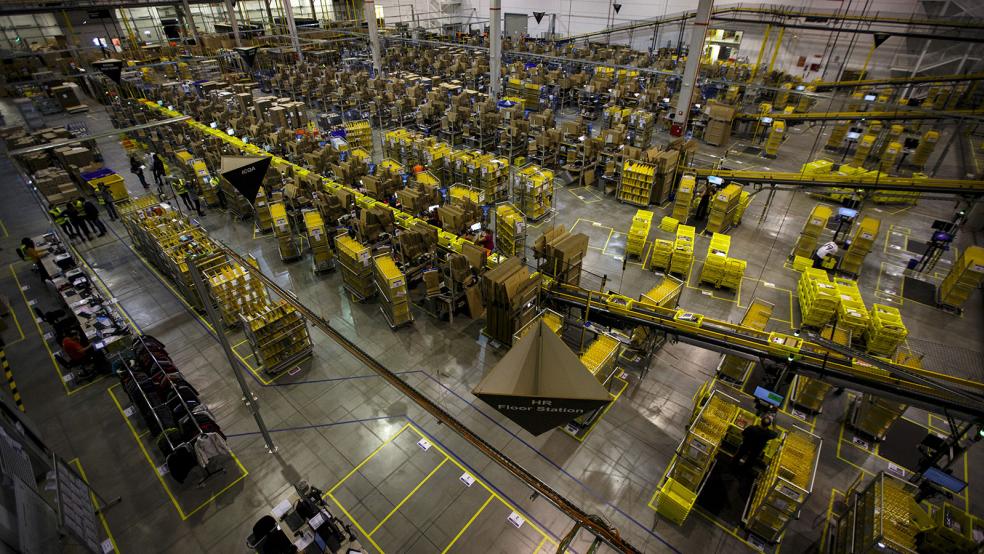America is over-malled, but not enough warehouses to support Amazon America is over-malled, but not enough warehouses to support Amazon
America has too many malls.
Related: Amazon's Next Target: Your Wardrobe
It's a problem that has vexed Wall Street and is an even darker cloud hanging over stocks known as real estate investment trusts, or REITs, which are the landlords for much of America's retail properties.
As sales by internet retailers grow, though, there could be one class of REITs poised to benefit, Jefferies analyst Jonathan Petersen wrote in a note to clients Friday.
While there is a glut of malls, there aren't nearly enough warehouses across the U.S. to support internet retailers like Amazon, Petersen said. "[R]etail sales are not in decline, but rather shifting toward e-commerce retailers who require large amounts of warehouse space."
"As retailers reconfigure their supply chain to accommodate the shift in consumer behavior, the requirement for warehousing space will increase substantially – this is true incremental demand, not a displacement of existing demand for warehouse square footage," STAG Industrial CEO Ben Butcher told CNBC.
"Amazon is an outlier in terms of the advanced stage of their supply chain buildout – others will need to catch up, which will be a continued tailwind to industrial demand," Butcher said.
Related: Why Walmart Is Still a Threat to Amazon and Whole Foods
Jefferies estimates that e-commerce retailers need three times as much warehouse space as brick-and-mortar retailers, presenting a huge window of opportunity for warehouse landlords — otherwise known as industrial REITs.
Names such as Rexford Industrial, Terreno and STAG Industrial are at the top of Jefferies' list. Other industrial REITs include Prologis, First Industrial and Monmouth.
E-commerce makes up about 10 percent of all retail sales. If internet companies double their share, it would create about 600 million square feet of new warehouse demand, Petersen estimated.
"There's simply little to no industrial product available," commercial real estate firm Jones Lang LaSalle, or JLL, wrote in a recent report on the U.S. industrial sector. "The market is on fire today for industrial property owners."
While traditional retailers are closing stores as shopper foot traffic slows, construction of new industrial properties is accelerating, JLL has found.
And much of the demand is coming from e-commerce companies, according to JLL, which estimates they represent about 40 percent of the leasing of industrial properties to date.
Amazon's deal for Whole Foods will likely spur a "last mile" investment by the internet giant and its competitors, Jefferies' Petersen has predicted. "Last mile" is a reference to the warehouse that is closest to a store, a crucial point of the distribution chain that makes same-day delivery possible.
"By analyzing all of Amazon's 'last mile' facilities by size and population demographics against the Industrial REIT portfolios, we found that REXR and TRNO are best positioned to serve the 'last mile,'" Petersen said.
Then, Amazon investing in so-called secondary and tertiary markets will benefit a REIT like STAG, he added.
It remains to be seen how mall REITs will bounce back from the negative headlines that have plagued them for much of this year, as they've been dragged down with the rest of the retail sector.
But Jefferies said Friday that it's raising price targets "across the board" for the industrial REITs, following a thorough analysis of the demand potential from e-commerce.
"We do not view the increase in ecommerce growth and warehouse demand over the past few years as cyclical, but more of a start of a secular growth trend that will continue for many more years."
Companies like Wal-Mart, Alibaba, Wayfair, Overstock and QVC should invest in new warehouses "to try to match the reach of Amazon" over the next few years, Petersen added.
In a twisted way, retail could still be real estate's bright spot after all.
This article originally appeared on CNBC. Read more from CNBC:
America is over-malled, but not enough warehouses to support Amazon
Is this oil-mageddon? Why one portfolio manager sees $30 oil on the horizon




